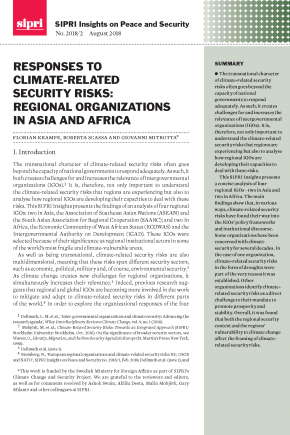Responses to Climate-related Security Risks: Regional Organizations in Asia and Africa
The transnational character of climate-related security risks often goes beyond the capacity of national governments to respond adequately. As such, it creates challenges for and increases the relevance of intergovernmental organizations (IGOs). It is, therefore, not only important to understand the climate-related security risks that regions are experiencing but also to analyse how regional IGOs are developing their capacities to deal with these risks.
This SIPRI Insights presents a concise analysis of four regional IGOs—two in Asia and two in Africa. The main findings show that, in various ways, climate-related security risks have found their way into the IGOs’ policy frameworks and institutional discourse. Furthermore, it was found that both the regional security context and the regions’ vulnerability to climate change affect the framing of climate-related security risks.
I. Introduction
II. The Association of Southeast Asian Nations
III. The South Asian Association for Regional Cooperation
IV. The Economic Community of West African States
V. The Intergovernmental Authority on Development
VI. Implications for policy and research



